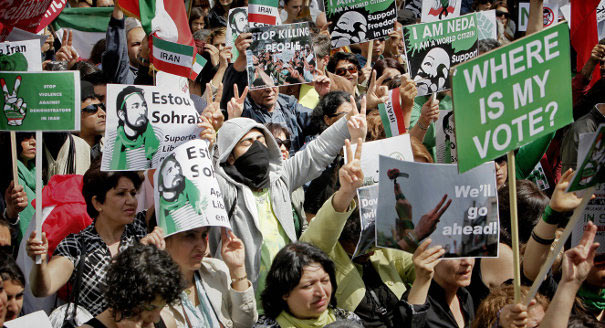Registration
Thank you!
You will receive an email confirming your registration.
The Carnegie Endowment for International Peace organized a screening of Forced Confessions, a documentary by veteran journalist and filmmaker Maziar Bahari about the experiences of Iranian political prisoners. The screening was followed by a discussion moderated by Carnegie’s Karim Sadjadpour with Bahari and Hadi Ghaemi, the founder and executive director of the International Campaign for Human Rights in Iran.
Forced Confessions
- Bahari’s Experience: Bahari was reporting for Newsweek in Tehran when he was arrested by Iranian security services in June 2009. He spent 118 days in jail, and was only released after falsely admitting—in a televised show trial—to collaborating with foreign intelligence agencies in helping to orchestrate Iran’s 2009 popular uprising. In Forced Confessions, he recounts this harrowing experience as well as the stories of five other acclaimed Iranian writers, journalists, and scholars who became victims of Iran’s torture chambers and were forced to confess to crimes they had never committed.
- Public Spectacle: In the discussion, Bahari noted that while show trials in Iran originally served to intimidate political opponents and demonstrate the regime’s righteousness, they have gradually lost all political credibility. He argued that they have evolved into public spectacles for the sadistic enjoyment of regime insiders.
Prospects for Reform
- No Viable Reformist Forces: Reflecting on the regime’s capacity for reform, Ghaemi argued that while the majority of Iranians desire a peaceful transition, there are no viable reformist political forces left in the country. The current internal political battle in Iran has given rise to new criticisms of the position of supreme leader in Iranian politics, but Ghaemi suggested that the regime might in fact become more, rather than less, repressive in order to prevent its demise.
- Political Maturity: Both speakers commented on the Iranian population’s increasing political maturity, as manifested in the peaceful 2009 demonstrations and a greater willingness in the Iranian human rights community to address previously taboo topics such as LGBT rights and discrimination against the Baha’i community.
- Iran’s Future: Bahari underlined that political reform represents the only viable option for Iran’s future, although he acknowledged that even after a political transition, Iranian society will still have to confront the internal societal dynamics that allowed the current regime to consolidate its power.
A Misguided Approach
- U.S. Policy: Both speakers agreed that the current U.S. sanctions should be better targeted in order to weaken the regime rather than hurt the Iranian people.
- Human Rights: Ghaemi criticized the international community for sidelining the question of Iranian human rights in the ongoing nuclear negotiations and failing to build an international coalition pressuring for democratic reforms.
- Propaganda: Bahari added that too little effort has been made to make the voices of Iranian citizens heard. In his view, the regime’s broadcasting corporation, which serves as its primary propaganda tool, represents an example of a more effective target for international sanctions.
